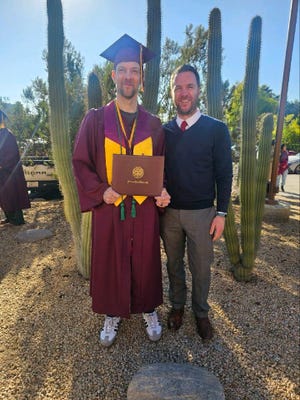
Bruce Ward may have been the unlikeliest graduate to cross the stage last week at Arizona State University.
Just three years ago, he was in prison, finishing an 11-year sentence. Now, he graduated with a Bachelor of Fine Arts.
It was in prison that Bruce learned art can lead to self-transformation. In prison, Bruce gained the confidence to enroll and succeed in college upon his release.
I know this because I taught him while he was incarcerated.
Arizona needs more success stories
We can produce more of these success stories. We can reimagine our correctional system to enhance the lives of people who live and work in that system while also enhancing public safety.
And the university can help make this happen.
I’m a criminologist and director of the ASU Center for Correctional Solutions. For the last 20 years, I’ve engaged in work that supports a reimagined approach to corrections.
Under the leadership of Ryan Thornell of the Arizona Department of Corrections, Rehabilitation and Reentry, Arizona’s correctional system can be transformed into a national model.
A reimagined corrections could promote wellbeing — physically, mentally, economically and with family — among people who are incarcerated to ensure they’re better than their arrival to the system.
A reimagined corrections could equip correctional staff with the professional development, training and support to carry out their work safely and in line with modern correctional practice.
How ASU is reimagining prison
Universities should do more in prison than just research and teaching.
At ASU, our charter guides us to assume fundamental responsibility for the economic, social, cultural and overall health of the communities we serve. We’re investing in the people who live and work in prison through our ASU POINT Model (Potential, Opportunity, Investment, Nurture, Transformation).
Counseling psychology faculty provide workshops in prisons to manage stress in relationships. Nursing students earn their clinical hours while administering prison medical care. Design and arts faculty and students transform the physical space of prisons so that it’s trauma-informed.
I’m thriving after prison:What others need to do the same
We’re working alongside people who live and work in corrections to empower them to be part of the solution.
These are promising starts.
But we can do so much more with additional investment.
System must focus on rehabilitation
Philanthropic support can empower us to scale and sustain ASU POINT Model efforts to leverage the full innovation of ASU.
The Legislature can support these efforts to make an impact that cuts across departments of economic security, corrections, education, health services, and housing.
And we can do all this with a public commitment from the university to include people who live and work in prison as part of our communities.
To some, this may look like “coddling criminals” in a way that makes our correctional facilities and our communities unsafe. But a corrections built on respect, rapport and engagement can actually lead to safer prisons, increased job satisfaction and organizational commitment among staff — not to mention lower recidivism.
Others may believe that people convicted of a crime are undeserving of our investment. But nearly everyone in prison will one day return to our communities.
Men and women can leave prison as supporting partners, loving parents, cooperating neighbors and contributing citizens when we build them up as individuals. Reimagining our correctional system simply demands a greater societal return on our investment in response to crime.
It’s time to invest in the incarcerated
Arizonans want that.
More than three in four individuals agree Arizona prisons should focus more on rehabilitation, including substance abuse, mental health and reentry programs and services — with strong majorities in each political party.
Bruce Ward is a part of this Arizona we want.
Ward, a U.S. Marine Corps veteran honorably discharged after serving our country through two tours in Iraq, is again contributing to our community. Last May, he co-curated our ASU {Ink}arcerated prison art show.
The show raised more than $30,000 to create the Center for Correctional Solutions Scholarship, which supports the education of people formerly incarcerated, people who work in corrections and their families.
The scholarship is another way to enhance the lives of people who live and work in our correctional system while also enhancing public safety.
We can achieve these goals — we just need to start investing in people while they’re incarcerated to make it happen.
Kevin Wright is associate professor in the Arizona State University School of Criminology and Criminal Justice and is director of ASU’s Center for Correctional Solutions. On X, formerly Twitter: @kwrightcrj.
This post was originally published on this site be sure to check out more of their content.






